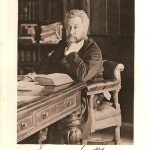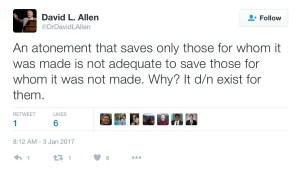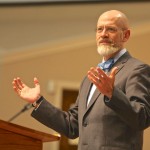 Article by Dr. R. C. Sproul – originally published in Tabletalk magazine.
Article by Dr. R. C. Sproul – originally published in Tabletalk magazine.
The late theologian Cornelius Van Til once made the observation that Calvinism is not to be identified with the so-called five points of Calvinism. Rather, Van Til concluded that the five points function as a pathway, or a bridge, to the entire structure of Reformed theology. Likewise, Charles Spurgeon argued that Calvinism is merely a nickname for biblical theology. These titans of the past understood that the essence of Reformed theology cannot be reduced to five particular points that arose as points of controversy centuries ago in Holland with the Remonstrants, who objected to five specific points of the system of doctrine found in historic Calvinism. Those five points have become associated with the acrostic TULIP: Total depravity, Unconditional election, Limited atonement, Irresistible grace, and Perseverance of the saints.
It is the task of this article to approach the question of Reformed theology from the perspective of what is called in philosophy the via negativa. This method of approaching truth defines things in terms of what they are not; hence, it is called the “way of negation.” For example, when we speak of the nature of God, we say that He is infinite, which simply means that He is “not finite.” This is an example of the use of the way of negation. When we have a clear understanding of how to employ this method, the way of affirmation, its opposite, becomes manifest. As we look at what Reformed theology is not, it helps us to understand what it is.
We begin by saying that Reformed theology is not a chaotic set of disconnected ideas. Rather, Reformed theology is systematic. We live in a time when systems of thought are decried in a postmodern world, not only in the secular arena of ideas, but even within Christian seminaries. Historically, the principle of systematic theology has been this: The Bible, being the Word of God, reflects the coherence and unity of the God whose Word it is. To be sure, it would be a distortion to take a foreign system of thought and force it upon Scripture, making Scripture conform to it as if it were some kind of procrustean bed. That is not the goal of sound, systematic theology. Rather, true systematic theology seeks to understand the system of theology that is contained within the whole scope of sacred Scripture. It does not impose ideas upon the Bible; it listens to the ideas that are proclaimed by the Bible and understands them in a coherent way.
The next point we make by way of negation is that Reformed theology is not anthropocentric. That is to say, Reformed theology is not centered on human beings. The central focal point of Reformed theology is God, and it’s the doctrine of God that permeates the whole of the substance of Reformed thought. Thus Reformed theology, by way of affirmation, can be called theocentric.
Though it is not often helpful to speak about paradoxes in our understanding of truth, there is nevertheless one paradox I like to maintain. On the one hand, the doctrine of God proper, that is, the doctrine of the nature, attributes, and character of God, affirmed by various creeds of Reformation thought, has little that is different from other theologies and other expressions of faith found among Lutherans, Roman Catholics, Methodists, and the like. At the same time, and herein lies the paradox, the most distinctive dimension of Reformed theology is its doctrine of God. Though it sounds like I’m writing out of both sides of my pen, let me hasten to clarify this paradoxical assertion. After Reformed theology articulates its doctrine of the nature and character of God in the first principles of its system of doctrine, it does not thereafter forget its affirmations when it addresses other doctrines. Rather, our understanding of the character of God is primary and determinant with respect to our understanding of all other doctrines. That is to say, our understanding of salvation has as its control factor, right at the heart of it, our understanding of the character of God.
Reformed theology is not anti-catholic. This may seem strange since Reformed theology grows directly out of the Protestant movement of the sixteenth century, which movement was called “Protestant” because it involved a “protest” against the teaching and activity of Roman Catholicism. But the term catholic refers to catholic Christianity, the essence of which may be found in the ecumenical creeds of the first thousand years of church history, particularly the early creeds and church councils, such as the council of Nicea in the fourth century and the council of Chalcedon in the fifth century. That is to say, those creeds contain common articles of faith shared by all denominations that embrace orthodox Christianity, doctrines such as the Trinity and the atonement of Christ. The doctrines affirmed by all Christians are at the heart and core of Calvinism. Calvinism does not depart on a search for a new theology and reject the common base of theology that the whole church shares.
Reformed theology is not Roman Catholic in its understanding of justification. This is simply to say that Reformed theology is evangelical in the historical sense of the word. In this regard, Reformed theology stands strongly and firmly with Martin Luther and the magisterial Reformers in their articulation of the doctrine of justification by faith alone. It affirms the solas of the Reformation, which are the formal and material causes of the sixteenth-century Reformation. Those two principles are the doctrines of sola Scriptura and sola fide. Neither of these doctrines are explicitly declared in the five points of Calvinism; yet, in a sense, they become the foundation for the other characteristics of Reformed theology.
These introductory statements about what Reformed theology is not are given a much broader and deeper expression in my book What Is Reformed Theology?, which was written to help laypersons and Christian leaders understand the essence of Reformed theology. In this article I am giving the bare-bones approach to the doctrine, reminding readers that Reformed theology so far transcends the mere five points of Calvinism that it is an entire life and world view. It is covenantal. It is sacramental. It is committed to transforming culture. It is subordinate to the operation of God the Holy Spirit, and it has a rich framework for understanding the entirety of the council of God revealed in the Bible.



